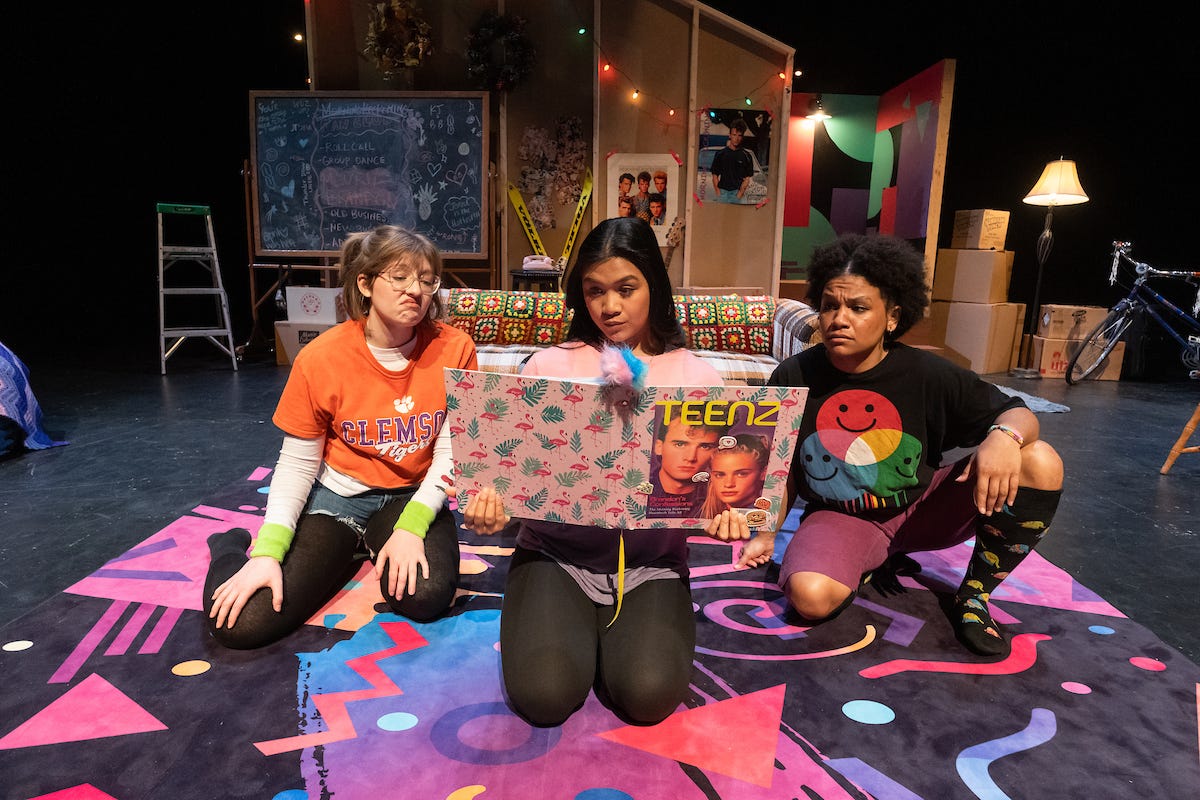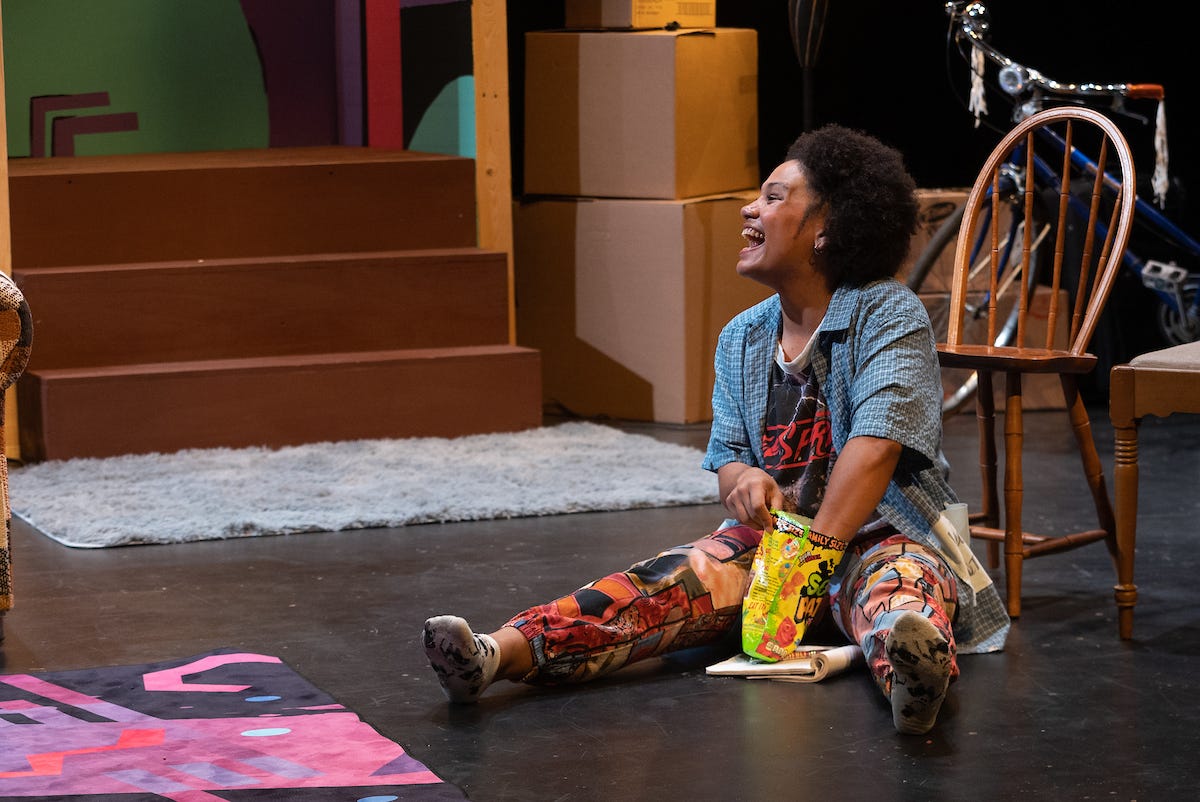Review: Morning Reckoning is the Nostalgic Teeny Bopper Comedy Millennials Need Right Now
Morning Reckoning is the Nostalgic Teeny Bopper Comedy Millennials Need Right Now
By Vanessa Reseland
The 2022–2023 CSA season at the New Hazlett Theater included much solemn material born of pandemic strife and reflection. Death, illness, suicide, loss, ostracization, and violence were consistent and meaningful themes at the New Hazlett Theater, but the final show of this CSA series, Kelly Trumbull’s Morning Reckoning, was a nostalgic throwback of a romp, gifting much-appreciated laughter and lightness to its audience. Lightness…but not insignificance.
Inspired by Trumbull’s real-life youth, often spent recreating famous, turn-of-the millennia pop performances with her childhood friends, Morning Reckoning is the memory-sparking, cringe-inducing, laugh-out-loud, coming-of-age story of five 8th grade friends in the suburbs of New Jersey in 1999.
Despite the omnipresence of the fictitious, titular boy band called Morning Reckoning, this show is less about boy-crazed, teen zealots (although it’s a little about that), and more about navigating social dynamics for the first time on your own. It’s about holding onto relationships born of proximity then challenged by individual growth. It’s about first friendships, first crushes, and the pain of growing up. It’s also really, really funny.
All female-identifying, relatively middle-class members of the “Morning Reckoning Fan Club,” each character holds their own distinct and recognizable personality.
Kandace is president of the fan club and self-appointed orchestrator of her friends’ social lives. Scenic designer Tucker Topel created Kandace’s ideal 1999 downstairs hideout. It is her family’s basement we inhabit throughout the play. It is her giant blackboard recording the agenda for the next meeting. It’s her childhood relics like the 90s must-have, Little Tikes plastic push pedal car that is discarded to the corner of the basement, taunting us with memories of a once simple childhood and giving way to the hormonal rush of teendom. They’re her beanbag and folding chairs, her plaid couch, her strung Christmas lights, her snacks, her rules, her plans, and she needs everyone to remember this. Somehow, Alex Manalo was able to play the domineering and inflexible Kandace with the balanced strokes of pathos and naive self-centeredness that made her remarkably charming.
Her best friend, Trish, initially a somewhat malleable sidekick but an ever-brewing foil for Kandace, is mild-mannered yet thoughtful. When she can’t attend the Morning Reckoning concert at Madison Square Garden due to her parents’ concerns about unsupervised, NYC public transit, she is shamed by Kandace and pacifies her bullying best friend by pushing off the topic and downplaying her loyalty to her parents. We receive subtle clues about Trish’s sexual orientation as she muses about physical attraction in general: “What makes a body hot?” Her theoretical queerness is met with surprising and relieving acceptance by Kandace, but her interest in a new female student in their grade opens up a new facet of Trish and a new insecurity for Kandace. Beautifully played by Matia Martin, Trish finds her voice as she begins to outgrow not only her allegiance to Morning Reckoning but to Kandace as well.
The other permanent members of the fan club are the loveable, life-of-the-party team of Sue (Jalina McClarin) and Emily (Mia Kurlfink). Feeling like true best friends with fresh, impulsive banter, the comedically theatrical moments between them feel more like your funniest friends doing bits at a party than actors reciting written jokes. Their joyful personalities and their relationship with each other feel the most reminiscent of relatable youth. In the talk-back, Trumbull discussed one directing approach she used in this rehearsal process called “active analysis.” In short, the actors learn the written piece and then improvise the scene over and over on their feet, getting the roles into their bodies and allowing for more of their instincts to infuse the characters. The duo of Sue and Emily felt like the most clear result of such a method. When directing your own piece, as Kelly Trumbull did with this show, it can be a challenge to let actors take your concept down unforeseen paths, but remaining open-minded proves to be a huge success for Trumbull, as she cast capable actors who brought such fresh originality to their scenes.
April, able to artfully tip-toe around Kandace’s triggers, was played by the adorable Claire Sabatine, who brought an innocence to the role that provided another needed layer to the friend group. She, too, aims to avoid Kandace’s volatility by appeasing her fancies. Whatever April needs to agree with is worth it because of Kandace’s bubbling fragility and likelihood to yell at them, so she is protecting both her and themselves. It is a survival strategy.

The only way for an audience to understand their adoration for the band and their connection to each other is to hear the music to which they pledge their allegiance. Original pop pieces, written and recorded by Addi Twig and Brad Stephenson, play throughout the show, providing hilariously witty energy. (We await the accompanying soundtrack — will it only be available on CD?!). Sound design by Samantha Magill hit every note perfectly. The choreography by Alex Manalo (yes, Kandace!) was spot-on in the most perfectly tongue-in-cheek meets completely sincere 90s kind of way. Watching these friends dance and lip-sync their hearts out glorified the enthusiastic bond of mutually stimulated youth.
Many people flinch at their middle school recollections. It is painful to revisit blocked memories of confusion, guilt, and disappointment, of the earliest betrayals inflicted upon us, and the betrayals we inflict, of self-consciousness, insecurity, and ignorance. Seeing this play lit up neural pathways from youth, otherwise hard to access. As we reflect on these “firsts,” we cringe at the feelings that were so mighty at the time but in hindsight can feel out of place and even manufactured. At the same time, the curation of world-wide cultural brands like *NSYNC, Backstreet Boys, or Britney Spears were, indeed, manufactured for us to go on these passionate, hormonal journeys. What emotional responses can possibly be authentic within the plasticity of market-targeted adolescence?
Morning Reckoning is the catalyst for the club’s enthusiasm and angst. Their images adorn the set on posters, pillows, and scrap books. The depictions of the boy band at the center of this production were admittedly and brilliantly image-generated by AI. None of the “boys” are or were ever real human people. It somehow adds another layer to the examined ridiculousness of celebrity worship. But could there be something developmentally worthwhile in Kandace’s delusional love for the lead singer, “Brandon Brixton?” To have a crush on a celebrity is to have a crush on a projection of someone who cannot reject you. It’s the reason adults in otherwise monogamous relationships still sometimes give themselves a celebrity “hall pass.” For a young teenager, unfamiliar with the world of romance, this is essential practice at having romantic feelings for someone. The emotions may be real, the imagination may be powerful, but it can never end because it never was.
Kandace’s reliable projection is confronted, though, when Brandon attempts suicide, which Kandace finds out through entertainment news. This “betrayal” hits her hard and comes out in one of the greatest, most ironic lines of the play, “It’s almost like I don’t know him at all!”

Personality types like Kandace’s can be very alluring. Leadership skills are common in such a dynamic and attractive personality, and to feel accepted by them is to feel special, hand-picked, elite, but with that, there is an often accompanying impulsiveness and lack of empathy. Seeing any remote criticism as a personal attack. For example, when Emily, in reference to a squabble between Kandace and Trish, diplomatically states, “I see both sides.” Kandace hears something much different, responding with, “Are you saying I’m a bad person?!”
Julia Kreutzer played the newest “should-be, would-be, could-be” member of the fan club, Nadia. Ignorant to all things Morning Reckoning, Nadia is an import from Indianapolis, where she was living on the grunge side of 90s music. A new connection with Trish brought her to a club meeting with the intention of making some new friends and exploring her relationship with Trish. While the other members of the club are welcoming and happy to indulge the newbie, Kandace fumes.
All Kandace offers her guest is uncomfortable banter, rude comments, and passive aggressive bullying. Amid a whispered, “I’m sorry” from Trish, Kandace finally erupts, shouting for Nadia to leave. Trish finally reaches her breaking point and takes a stand against her supposed best friend, erupting with a painful, “Nobody likes you!” It is a comeuppance that seems almost too harsh until Kandace makes a move nobody seemed to expect. As Nadia ascends the stairs to exit the basement, Kandace screams while bolting up the handful of steps to yank Nadia to the ground. Expertly choreographed by Jose Perez IV, Nadia hits her head and falls to the ground, lying motionless for several moments before a blackout.
At this point, some of us wondered if Nadia was dead, but most of us decided that a tonal departure of that magnitude was unlikely given the show we had seen up until that point. The panel eventually landed on the interpretation that the act of violence itself had crossed such a line that there would be dire consequences. The fractioning of these relationships after such an unwarranted affront would likely dismantle the club and send each character down their next, individual path toward adulthood. Their collective story is effectively over.
The blackout could have been a dramatic ending to the show, but what followed felt like the initiation of a new scene. We open on Kandace, crying alone in the same basement in a moment of her own reckoning. However, what quickly followed was a surreal epilogue, free of dialogue. A hellish and shadowy red glow by lighting designer, Hope Debelius, suddenly eclipsed the stage. Soon, each member of the MR fan club reentered, reuniting for a final lip sync/dance performance, including Nadia and the production’s swing, Gabby Castrodad. It was a sequence more closely resembling a scene from Twin Peaks than Girls Just Wanna Have Fun. It evoked the image of “rolling credits,” despite the fact that the show felt forgivably unfinished.
Morning Reckoning’s charm, humor, and nostalgia resounded despite the stunning and confusing final moments. If anything, it made us speculate about a second act. Perhaps, instead of “rolling credits,” we should be thinking, “to be continued…”
Kelly Trumbull seemed to be connected to many of the evening’s attendees. A long-time Pittsburgh actor, director, and educator, this was her first venture as a playwright, and if the support for this “theatre artist’s theatre artist” was overheard in the audience’s pre-show chatter, it resounded in the post-show Q&A. If she wants a second act as much as we do, it’s bound to grace a nearby stage sooner than later. This I promise you.
